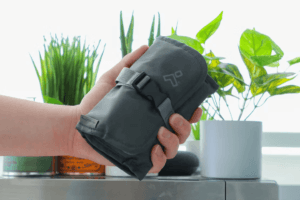Peak Design Travel Backpack 45L Review
The Peak Design Travel Backpack 45L redefines what’s possible in carry-on travel. After rigorous testing across varied environments, we’ve discovered both revolutionary features and a few notable drawbacks that adventurers should consider.
Our Verdict
Pros
- Very smart design.
- Innovative—and fast—harness hiding system.
- Feature-fit for almost any carry.
Cons
- Zipper choice is puzzling.
- Sternum strap comes off a little easily for our liking.
- Side handles provide a funky, imbalanced carry.
Technical Details
Disclaimer: We take the measurements of the bag provided by the manufacturer and compare them to the allowance listed on airline websites. This should be used as a guideline rather than a rule. Bags can change size as you pack them out, and every airline’s interpretation of compliance is different. Just because a bag is listed as carry-on compliant here doesn’t mean that the airline will interpret it that way.

Carry-on Compliance
View 19/145 Airlines

Like the Look
Polled on Instagram
- Capacity: 45l
- Weight (lb): 4.55 lb (2.1 kg)
- Dimensions: 22 in x 13 in x 9.5 in (55.9 x 33 x 24.1 cm) Depth increases to 11" (28 cm) when expanded
- Notable Materials: Aluminum, Hypalon®, Polyurethane, DWR Coating, YKK Zippers, Nylon, Zoom Zippers
- Manufacturing Country: Vietnam
- Laptop Compartment Size: 16"
- Warranty Information: Peak Design Lifetime Product Warranty
Full Review
After three intense weeks of field testing across multiple states and numerous flights, we’ve put the Peak Design Travel Backpack 45L through its paces. Peak Design’s reputation for innovation in the photography world with their Everyday Backpack left us eager to examine their venture into travel gear. For those seeking a more compact option, explore our review of the Peak Design Travel Backpack 30L.

Materials & Aesthetic
The Travel Gear Collective team tested both available colorways – black on black and sage. While the black version maintains a professional profile, the sage offers a unique greenish tint that sets it apart from Peak Design’s traditional ash color scheme.

The pack’s construction features a 400D nylon canvas main body complemented by a 900D nylon canvas base panel for enhanced durability. This base material has a distinctive tactile quality – slightly rubbery but purposefully chosen over the more common ballistic nylon. Our testing confirmed impressive weather resistance and a refined feel.

We conducted a survey through our Instagram following to gauge public reaction to the design. The results showed 69% approval of the aesthetic, while 31% weren’t convinced by the look.
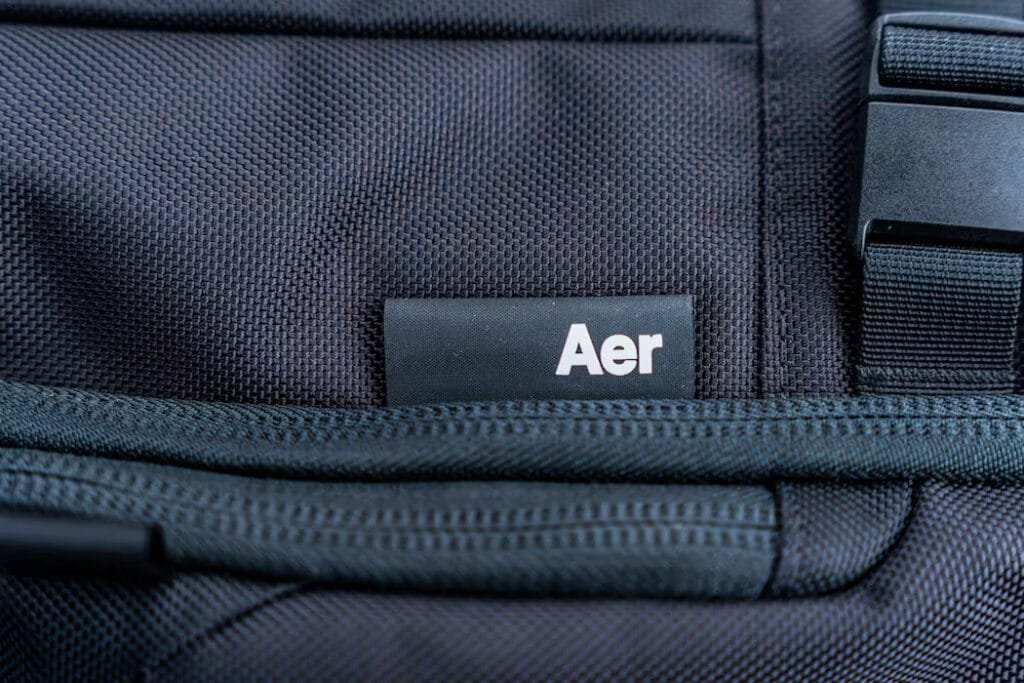
Additional materials include a DWR coated polyurethane liner for weather protection, aluminum hardware for durability, and a mix of YKK and Zoom zippers. The Zoom zipper choice raised some questions during our testing, which we’ll address later in this review.
External Features
Our extensive testing revealed a wealth of innovative external features that set this pack apart. The harness system particularly impressed us during field testing – it’s a masterclass in functional design.

The shoulder straps feature Peak Design’s distinctive rotating mechanism, which we tested extensively across urban environments. Each strap pivots on a metal rivet at the top, allowing fluid movement for quick side access while wearing the pack.

The high-density foam shoulder straps deliver superior comfort compared to the Everyday Backpack. Peak Design upgraded the padding significantly, and our team noticed the improvement during long hauls. The straps incorporate aluminum glide hardware for adjustments and include plastic keepers to manage excess material.
For comparison, the Evergoods MPL30 offers an alternative approach to strap management worth considering. One note: reattaching the plastic keeper requires removing the pack for adjustment.

The detachable sternum strap stores vertically along the shoulder strap or as a temporary loop. During testing, we found the attachment mechanism slightly loose – one side consistently detached easier than the other. While Peak Design offers replacements, we recommend monitoring the strap’s security.

The hideaway hip belt incorporates the same rotating system and proved its worth during our tests. The left side features a 3D mesh pocket with enough give for rigid items, while the right side includes attachment points compatible with the field pouch and other Peak Design accessories.
The hip belt’s design approaches perfection – optimal padding, size, and stowability. The aluminum hardware requires adjustment from traditional plastic buckles but delivers lasting durability and smooth operation.
The entire harness system showcases Peak Design’s engineering prowess. Our team tested dozens of hideaway systems, and this ranks as the fastest and most efficient we’ve encountered. The process is remarkably simple: rotate the hip belt up and tuck it away, then rotate and stow the shoulder straps. No detachment or zippers required.

A central handle emerges for duffel-style carry or roller luggage attachment once the straps are concealed. The folded strap-hiding material doubles as extra back panel padding and ventilation – an ingenious dual-purpose design. Pro tip: ensure the hip belt lies completely flat when stowed to prevent pressure points.

The pack includes a luggage tag slot marked by a subtle icon on the back panel. Two observations from our testing:
- The hidden design maintains aesthetics but sacrifices visibility – a hanging tag would be more noticeable for lost bag recovery
- Production models feature velcro securing, addressing the loose fit in our review unit.
Our testing revealed an exceptionally versatile water bottle compartment capable of accommodating everything from standard Nalgene bottles to larger S’well containers. The pocket’s expandable design handles virtually any bottle size short of a full gallon container.

Within the water bottle sleeve, we discovered a discreet zippered compartment – an innovative security feature. Despite initial concerns about space constraints, the gusseted design provides surprising capacity. During testing, we successfully stored plus-sized phones and quick-access items alongside a full water bottle. The hidden zipper placement adds security, as the unusual pocket placement makes it practically invisible to unfamiliar eyes.
This thoughtful space utilization demonstrates Peak Design’s commitment to maximizing every inch – crucial for efficient one-bag travel.

The bag features four strategic grab handles. The padded top handle enables flush wall-hanging, while two side handles facilitate quick overhead bin retrieval – though their off-center placement makes extended carrying somewhat awkward. A bottom handle completes the all-angles access design.
The front panel incorporates a magnetic pocket with lash strap compatibility. This compartment proved perfect for rain protection gear during sudden weather changes, though it also accommodates other flat items effectively.
(Note: Our test unit arrived without lash straps – either an oversight or loss during our three-week testing period.)
The lash system mirrors the attachment functionality found on the Everyday Backpack, with anchor points distributed across the exterior – even inside the water bottle pocket. This creates numerous configuration possibilities.

Two distinct compression systems manage the pack’s volume. External compression zippers expand capacity by several liters, while an innovative button system at the top provides additional compression. Peak Design indicates the button placement may change in production models. Even compressed, the bag maintains substantial size – we recommend packing a separate daypack if compact carry is priority.
Inside The Pack

The top quick-grab compartment impressed our team with its seamless integration into the pack’s design. A stretchy mesh interior provides organized storage for essential travel documents and items needed during security checks.

The front panel interior reveals sophisticated organization options. We tested the distinctive rubbery mesh top pocket extensively – its curved zipper design enables superior access. Inside, we found dedicated sleeves for writing implements and larger pockets that efficiently housed our power banks and international adapters. These pockets compress flat when empty, preserving valuable space.
During rigorous testing, we noticed the pen slots run slightly loose – secure storage isn’t guaranteed during active movement. The bottom section features an additional unstructured pocket ideal for flat items.

The opposing side mirrors this layout with half-mesh upper storage and a liner pocket below. The standout feature here is the dual-access design – we accessed these compartments from both the main chamber and front panel during our tests. The separator includes an innovative self-storing feature, zipping away into the bottom of the main compartment to create one expansive space. This versatility transformed how we approached packing during different travel scenarios.
The main compartment offers access through both this front panel configuration and a dedicated back entry. Here we encountered the Zoom zippers mentioned earlier in our materials assessment…
Our testing revealed an unexpected design choice: Peak Design’s use of Zoom zippers for the main compartment instead of industry-standard YKK. While YKK dominates the premium travel pack segment, Peak Design opted for Zoom on primary access points.

Through our network of gear testers, we’ve documented several Zoom zipper failures on other Peak Design products – specifically the Everyday Messenger and Everyday Backpack. While Peak Design’s customer service consistently provides excellent warranty support, a failed zipper in remote locations could compromise your entire journey.
The #10 zipper appears robust, but our experience with Zoom zippers gives us pause. Premium travel pack manufacturers consistently choose YKK for reliability.
Update: Peak Design provided this response regarding their zipper choice:
“Regarding our use of Zoom zips on the main access points, we’ve chosen Zoom because of a number of factors: strength, feel, testing performance, performance over time, and value. We’ve used Zoom zips across all of our bags, all of which are guaranteed for life, and we’ve seen a sub-0.3% failure rate on them. Another big part of our decision to use Zoom is that we’ve been able to develop a close direct relationship with them, something we’re not able to do with a supplier of YKK’s size. Zoom has been super responsive to our requests for tweaks and customizations. We pride ourselves in honing every last detail of our products to perform their specific functions optimally, and working with Zoom has allowed us to do that.”

The main compartment features a spacious design optimized for Peak Design’s travel accessories and packing cubes. While their proprietary system isn’t mandatory, we found it enhanced organization during testing.
Elastic side loops integrate seamlessly with Peak Design’s camera cube system, providing additional padding and secure mounting for photography equipment.

The laptop compartment, accessed through a partial unzip of the main compartment, accommodates larger laptops with room to spare. A separate tablet partition, secured by Velcro, worked well for our Kindle during testing. One minor issue: the tablet partition’s Velcro target proved smaller than ideal, requiring visual alignment for secure closure.

Side access zippers enable quick retrieval of strategically packed items – particularly valuable when using the camera cube insert for lens changes.

Every zipper features security-conscious design elements:
- Front zippers secure via bottom loops
- Side zippers connect to internal toggles
- Main compartment zippers link through a loop-and-button mechanism

While these security features won’t stop determined theft, our testing confirmed they effectively deter opportunistic access.
Durability & Testing
Our three-week testing period across Detroit, Minneapolis, and Northern Minnesota included two flights. The pack performed exceptionally well, with only minor aluminum hardware scratching on the sternum strap. The exterior fabric maintained its pristine condition, and all zippers functioned smoothly throughout testing.
Beyond our initial zipper concerns, the pack’s performance exceeded expectations, showcasing Peak Design’s meticulous attention to detail.
Usage Timeline
Initial Usage
Condition: Excellent
The innovative features impressed immediately, though the hip belt clip required adjustment time.
Condition: Excellent
Performance remained consistent. Aluminum hardware showed minor scratching, but no other durability issues emerged.
Condition: Excellent
The intuitive design continued to shine. Integration with Peak Design Packing Accessories proved seamless during extended testing.
Condition: Good
Testing expanded to include Paris and Alabama trips from Detroit. Exterior fabric showed minimal marking despite intensive use.
Condition: Good
- All components remain intact with no additional wear
- Confirmed compatibility with international airline underseat storage
- Back panel ventilation performed well in high temperatures
- Demonstrated water resistance during marine exposure
- Daily use revealed slower access times due to clamshell design in confined spaces

Author: The Travel Gear Collective Team
The Travel Gear Collective team combines expertise from gear designers, professional photographers, adventure guides, and sustainable travel specialists. Our rigorous testing protocols and real-world experience inform every review, ensuring practical insights for travelers worldwide.
Other Bags & Pouch Reviews
Table of Contents
Peak Design Travel Backpack 45L Review
The Peak Design Travel Backpack 45L redefines what’s possible in carry-on travel. After rigorous testing across varied environments, we’ve discovered both revolutionary features and a few notable drawbacks that adventurers should consider.
Our Verdict
Pros
- Very smart design.
- Innovative—and fast—harness hiding system.
- Feature-fit for almost any carry.
Cons
- Zipper choice is puzzling.
- Sternum strap comes off a little easily for our liking.
- Side handles provide a funky, imbalanced carry.
Technical Details
Disclaimer: We take the measurements of the bag provided by the manufacturer and compare them to the allowance listed on airline websites. This should be used as a guideline rather than a rule. Bags can change size as you pack them out, and every airline’s interpretation of compliance is different. Just because a bag is listed as carry-on compliant here doesn’t mean that the airline will interpret it that way.

Carry-on Compliance
View 19/145 Airlines

Like the Look
Polled on Instagram
- Capacity: 45l
- Weight (lb): 4.55 lb (2.1 kg)
- Dimensions: 22 in x 13 in x 9.5 in (55.9 x 33 x 24.1 cm) Depth increases to 11" (28 cm) when expanded
- Notable Materials: Aluminum, Hypalon®, Polyurethane, DWR Coating, YKK Zippers, Nylon, Zoom Zippers
- Manufacturing Country: Vietnam
- Laptop Compartment Size: 16"
- Warranty Information: Peak Design Lifetime Product Warranty
Full Review
After three intense weeks of field testing across multiple states and numerous flights, we’ve put the Peak Design Travel Backpack 45L through its paces. Peak Design’s reputation for innovation in the photography world with their Everyday Backpack left us eager to examine their venture into travel gear. For those seeking a more compact option, explore our review of the Peak Design Travel Backpack 30L.
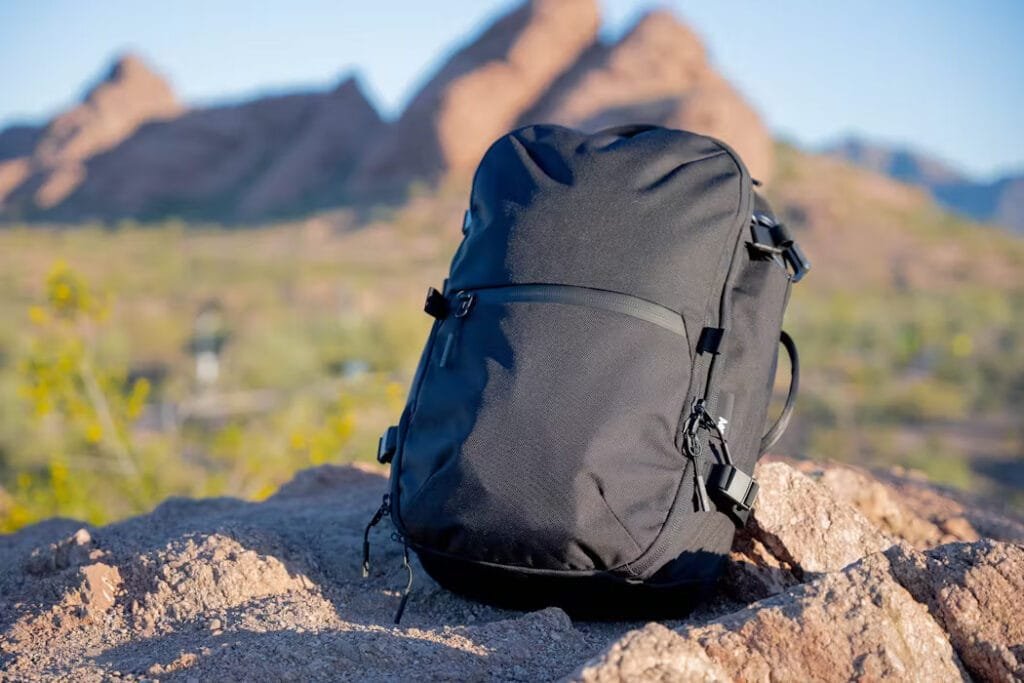
Materials & Aesthetic
The Travel Gear Collective team tested both available colorways – black on black and sage. While the black version maintains a professional profile, the sage offers a unique greenish tint that sets it apart from Peak Design’s traditional ash color scheme.

The pack’s construction features a 400D nylon canvas main body complemented by a 900D nylon canvas base panel for enhanced durability. This base material has a distinctive tactile quality – slightly rubbery but purposefully chosen over the more common ballistic nylon. Our testing confirmed impressive weather resistance and a refined feel.

We conducted a survey through our Instagram following to gauge public reaction to the design. The results showed 69% approval of the aesthetic, while 31% weren’t convinced by the look.

Additional materials include a DWR coated polyurethane liner for weather protection, aluminum hardware for durability, and a mix of YKK and Zoom zippers. The Zoom zipper choice raised some questions during our testing, which we’ll address later in this review.
External Features
Our extensive testing revealed a wealth of innovative external features that set this pack apart. The harness system particularly impressed us during field testing – it’s a masterclass in functional design.
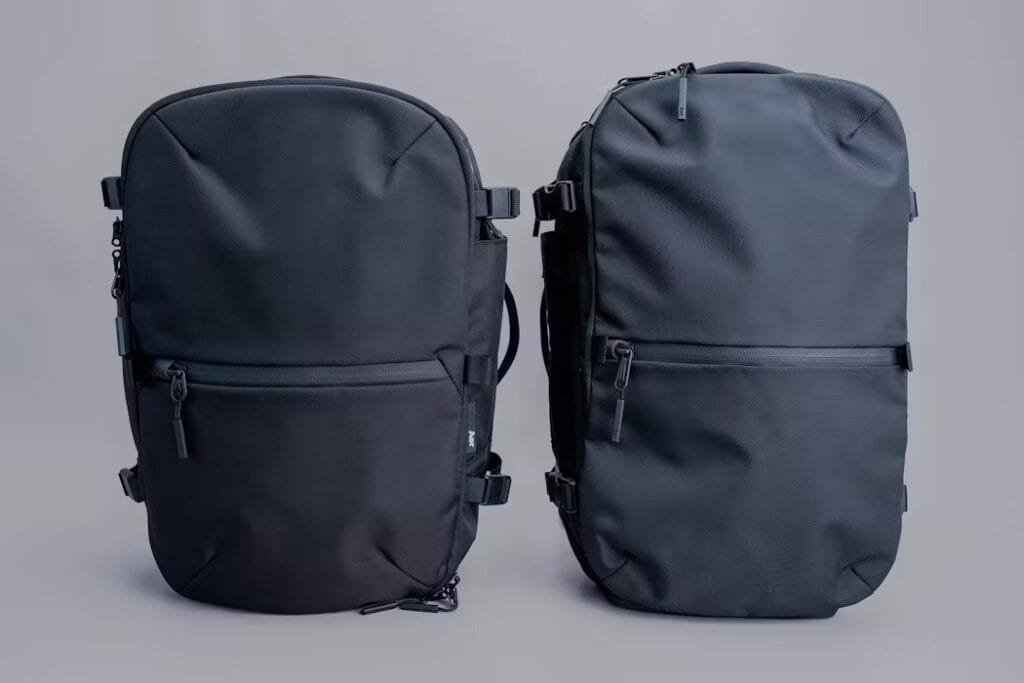
The shoulder straps feature Peak Design’s distinctive rotating mechanism, which we tested extensively across urban environments. Each strap pivots on a metal rivet at the top, allowing fluid movement for quick side access while wearing the pack.
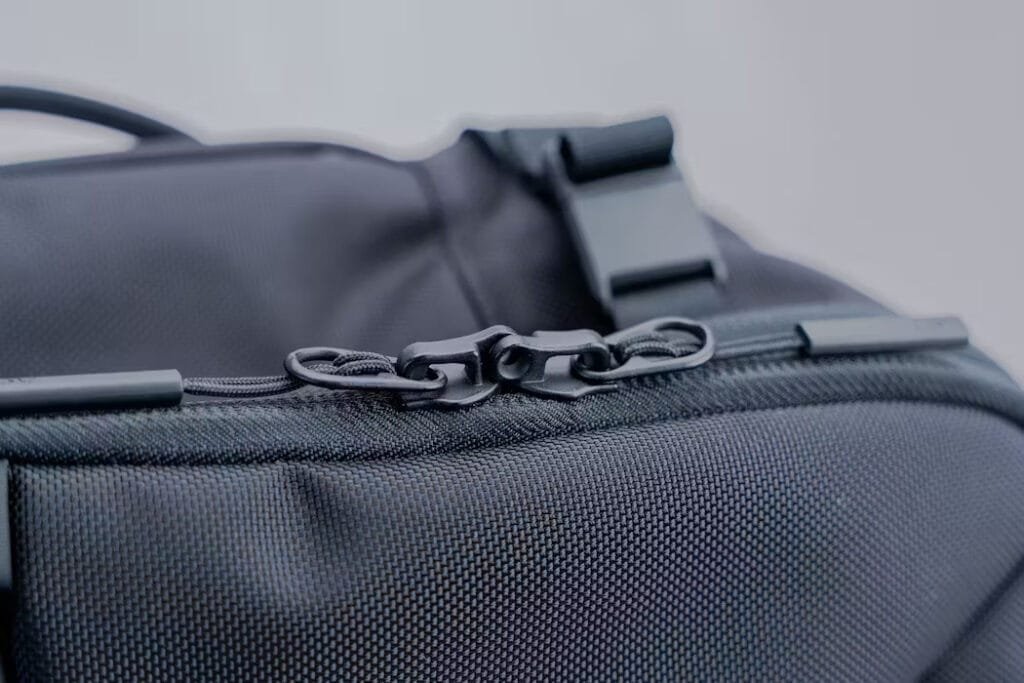
The high-density foam shoulder straps deliver superior comfort compared to the Everyday Backpack. Peak Design upgraded the padding significantly, and our team noticed the improvement during long hauls. The straps incorporate aluminum glide hardware for adjustments and include plastic keepers to manage excess material.
For comparison, the Evergoods MPL30 offers an alternative approach to strap management worth considering. One note: reattaching the plastic keeper requires removing the pack for adjustment.

The detachable sternum strap stores vertically along the shoulder strap or as a temporary loop. During testing, we found the attachment mechanism slightly loose – one side consistently detached easier than the other. While Peak Design offers replacements, we recommend monitoring the strap’s security.

The hideaway hip belt incorporates the same rotating system and proved its worth during our tests. The left side features a 3D mesh pocket with enough give for rigid items, while the right side includes attachment points compatible with the field pouch and other Peak Design accessories.
The hip belt’s design approaches perfection – optimal padding, size, and stowability. The aluminum hardware requires adjustment from traditional plastic buckles but delivers lasting durability and smooth operation.
The entire harness system showcases Peak Design’s engineering prowess. Our team tested dozens of hideaway systems, and this ranks as the fastest and most efficient we’ve encountered. The process is remarkably simple: rotate the hip belt up and tuck it away, then rotate and stow the shoulder straps. No detachment or zippers required.

A central handle emerges for duffel-style carry or roller luggage attachment once the straps are concealed. The folded strap-hiding material doubles as extra back panel padding and ventilation – an ingenious dual-purpose design. Pro tip: ensure the hip belt lies completely flat when stowed to prevent pressure points.

The pack includes a luggage tag slot marked by a subtle icon on the back panel. Two observations from our testing:
- The hidden design maintains aesthetics but sacrifices visibility – a hanging tag would be more noticeable for lost bag recovery
- Production models feature velcro securing, addressing the loose fit in our review unit.
Our testing revealed an exceptionally versatile water bottle compartment capable of accommodating everything from standard Nalgene bottles to larger S’well containers. The pocket’s expandable design handles virtually any bottle size short of a full gallon container.

Within the water bottle sleeve, we discovered a discreet zippered compartment – an innovative security feature. Despite initial concerns about space constraints, the gusseted design provides surprising capacity. During testing, we successfully stored plus-sized phones and quick-access items alongside a full water bottle. The hidden zipper placement adds security, as the unusual pocket placement makes it practically invisible to unfamiliar eyes.
This thoughtful space utilization demonstrates Peak Design’s commitment to maximizing every inch – crucial for efficient one-bag travel.

The bag features four strategic grab handles. The padded top handle enables flush wall-hanging, while two side handles facilitate quick overhead bin retrieval – though their off-center placement makes extended carrying somewhat awkward. A bottom handle completes the all-angles access design.
The front panel incorporates a magnetic pocket with lash strap compatibility. This compartment proved perfect for rain protection gear during sudden weather changes, though it also accommodates other flat items effectively.
(Note: Our test unit arrived without lash straps – either an oversight or loss during our three-week testing period.)
The lash system mirrors the attachment functionality found on the Everyday Backpack, with anchor points distributed across the exterior – even inside the water bottle pocket. This creates numerous configuration possibilities.

Two distinct compression systems manage the pack’s volume. External compression zippers expand capacity by several liters, while an innovative button system at the top provides additional compression. Peak Design indicates the button placement may change in production models. Even compressed, the bag maintains substantial size – we recommend packing a separate daypack if compact carry is priority.
Inside The Pack
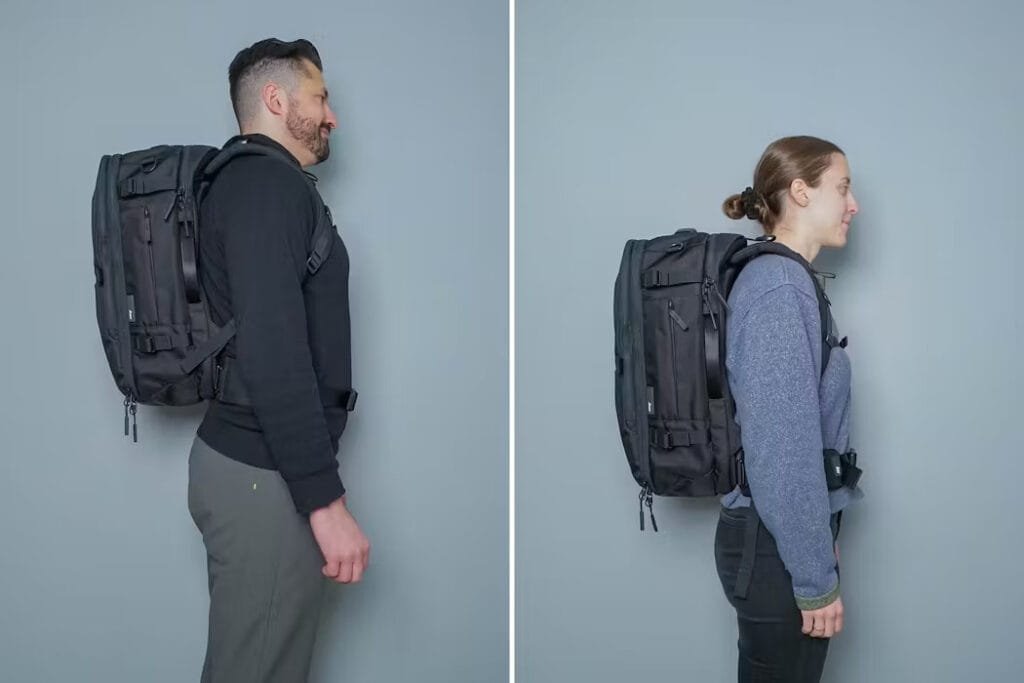
The top quick-grab compartment impressed our team with its seamless integration into the pack’s design. A stretchy mesh interior provides organized storage for essential travel documents and items needed during security checks.
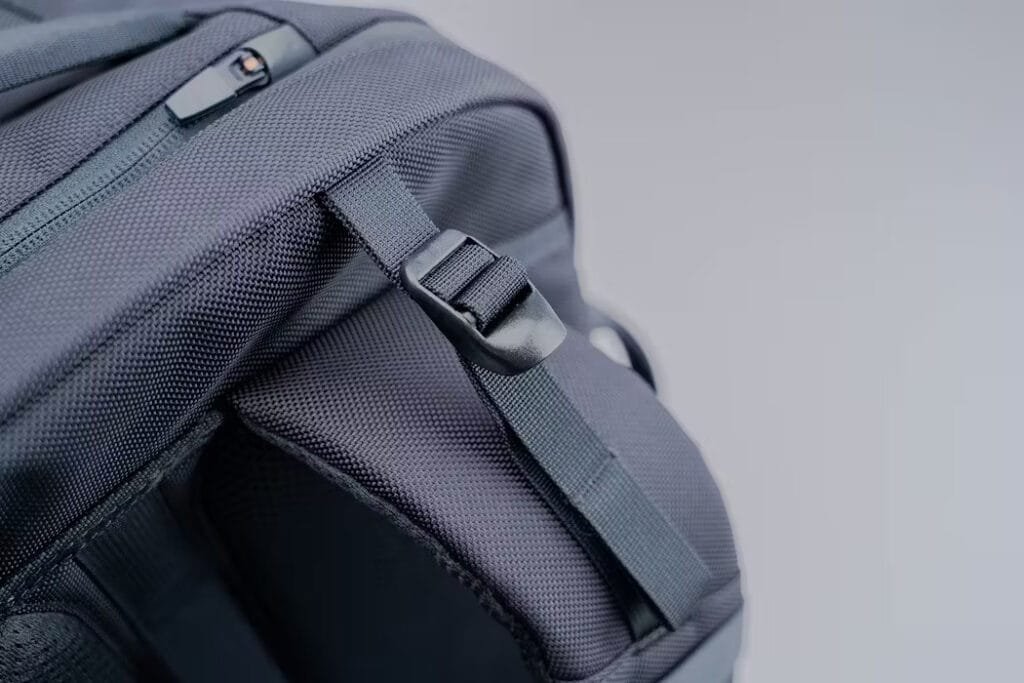
The front panel interior reveals sophisticated organization options. We tested the distinctive rubbery mesh top pocket extensively – its curved zipper design enables superior access. Inside, we found dedicated sleeves for writing implements and larger pockets that efficiently housed our power banks and international adapters. These pockets compress flat when empty, preserving valuable space.
During rigorous testing, we noticed the pen slots run slightly loose – secure storage isn’t guaranteed during active movement. The bottom section features an additional unstructured pocket ideal for flat items.
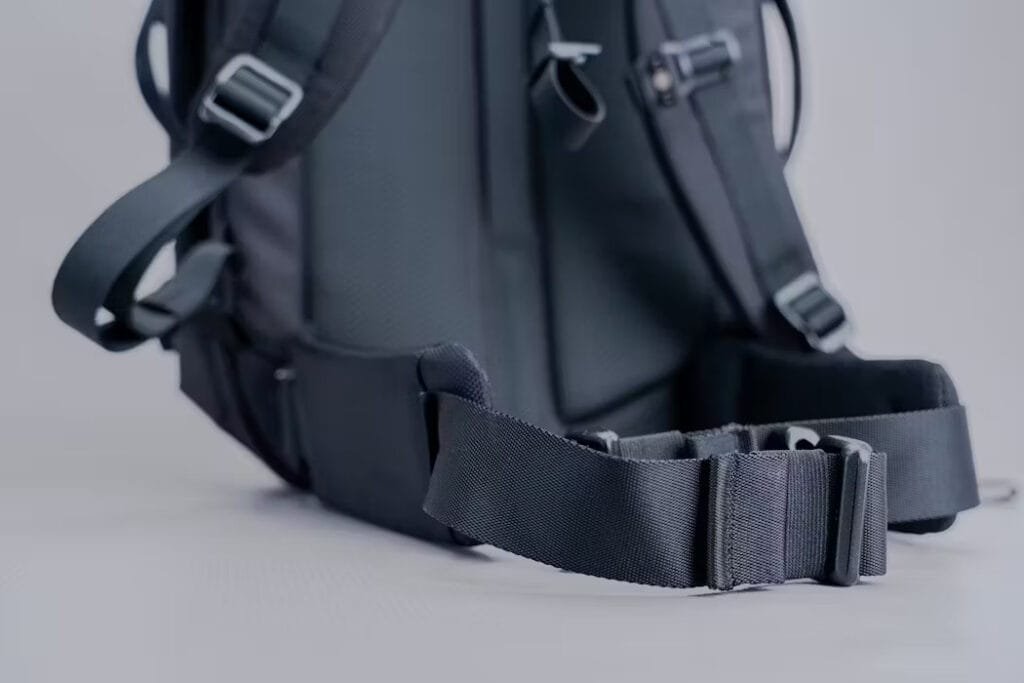
The opposing side mirrors this layout with half-mesh upper storage and a liner pocket below. The standout feature here is the dual-access design – we accessed these compartments from both the main chamber and front panel during our tests. The separator includes an innovative self-storing feature, zipping away into the bottom of the main compartment to create one expansive space. This versatility transformed how we approached packing during different travel scenarios.
The main compartment offers access through both this front panel configuration and a dedicated back entry. Here we encountered the Zoom zippers mentioned earlier in our materials assessment…
Our testing revealed an unexpected design choice: Peak Design’s use of Zoom zippers for the main compartment instead of industry-standard YKK. While YKK dominates the premium travel pack segment, Peak Design opted for Zoom on primary access points.

Through our network of gear testers, we’ve documented several Zoom zipper failures on other Peak Design products – specifically the Everyday Messenger and Everyday Backpack. While Peak Design’s customer service consistently provides excellent warranty support, a failed zipper in remote locations could compromise your entire journey.
The #10 zipper appears robust, but our experience with Zoom zippers gives us pause. Premium travel pack manufacturers consistently choose YKK for reliability.
Update: Peak Design provided this response regarding their zipper choice:
“Regarding our use of Zoom zips on the main access points, we’ve chosen Zoom because of a number of factors: strength, feel, testing performance, performance over time, and value. We’ve used Zoom zips across all of our bags, all of which are guaranteed for life, and we’ve seen a sub-0.3% failure rate on them. Another big part of our decision to use Zoom is that we’ve been able to develop a close direct relationship with them, something we’re not able to do with a supplier of YKK’s size. Zoom has been super responsive to our requests for tweaks and customizations. We pride ourselves in honing every last detail of our products to perform their specific functions optimally, and working with Zoom has allowed us to do that.”

The main compartment features a spacious design optimized for Peak Design’s travel accessories and packing cubes. While their proprietary system isn’t mandatory, we found it enhanced organization during testing.
Elastic side loops integrate seamlessly with Peak Design’s camera cube system, providing additional padding and secure mounting for photography equipment.

The laptop compartment, accessed through a partial unzip of the main compartment, accommodates larger laptops with room to spare. A separate tablet partition, secured by Velcro, worked well for our Kindle during testing. One minor issue: the tablet partition’s Velcro target proved smaller than ideal, requiring visual alignment for secure closure.

Side access zippers enable quick retrieval of strategically packed items – particularly valuable when using the camera cube insert for lens changes.

Every zipper features security-conscious design elements:
- Front zippers secure via bottom loops
- Side zippers connect to internal toggles
- Main compartment zippers link through a loop-and-button mechanism

While these security features won’t stop determined theft, our testing confirmed they effectively deter opportunistic access.
Durability & Testing
Our three-week testing period across Detroit, Minneapolis, and Northern Minnesota included two flights. The pack performed exceptionally well, with only minor aluminum hardware scratching on the sternum strap. The exterior fabric maintained its pristine condition, and all zippers functioned smoothly throughout testing.
Beyond our initial zipper concerns, the pack’s performance exceeded expectations, showcasing Peak Design’s meticulous attention to detail.
Usage Timeline
Initial Usage
Condition: Excellent
The innovative features impressed immediately, though the hip belt clip required adjustment time.
Condition: Excellent
Performance remained consistent. Aluminum hardware showed minor scratching, but no other durability issues emerged.
Condition: Excellent
The intuitive design continued to shine. Integration with Peak Design Packing Accessories proved seamless during extended testing.
Condition: Good
Testing expanded to include Paris and Alabama trips from Detroit. Exterior fabric showed minimal marking despite intensive use.
Condition: Good
- All components remain intact with no additional wear
- Confirmed compatibility with international airline underseat storage
- Back panel ventilation performed well in high temperatures
- Demonstrated water resistance during marine exposure
- Daily use revealed slower access times due to clamshell design in confined spaces

Author: The Travel Gear Collective Team
The Travel Gear Collective team combines expertise from gear designers, professional photographers, adventure guides, and sustainable travel specialists. Our rigorous testing protocols and real-world experience inform every review, ensuring practical insights for travelers worldwide.
